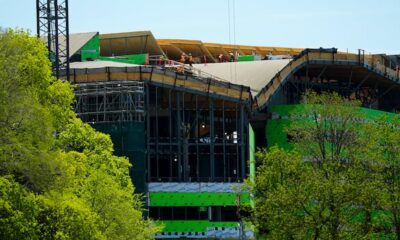World
Freedom Convoy Leaders Receive House Arrest Sentences in Ottawa

Prominent organizers of the 2022 Freedom Convoy, Chris Barber and Tamara Lich, were sentenced to 12 months of house arrest and an additional six months of curfew as part of their penalties for the blockade that paralyzed downtown Ottawa. The Ontario Court decision came on Tuesday, with Justice Heather Perkins-McVey stating that the actions of the accused had significantly disrupted the lives of Ottawa residents.
During the hearing, Justice Perkins-McVey remarked on the serious nature of the crimes committed, describing them as “mischief” that negatively impacted citizens who sought to live peacefully in their community. She highlighted the chaos caused by the protest, which included incessant honking and blocked roads due to the presence of large trucks. This three-week blockade, which occurred in February 2022, led the federal government to invoke the Emergencies Act, granting police extraordinary powers to dismantle the protest.
Both Barber and Lich received conditional sentences beginning with 12 months of house arrest, followed by a six-month curfew from 22:00 to 05:00. They are also required to complete 100 hours of community service. In a notable point of consideration, Lich will serve only three and a half months of curfew due to the time she has already spent in custody.
In rejecting the Crown’s calls for more severe penalties—seven years for Lich and eight for Barber—Justice Perkins-McVey emphasized the political divide reflected in the sentencing requests. She clarified that political considerations should not influence the fairness of the judicial process.
Barber faced an additional charge of counselling others to disobey a court order that prohibited continuous honking. The courtroom was filled with supporters for both organizers, who expressed their admiration after the sentencing. Perkins-McVey referred to Lich as the “face of the convoy” and Barber as a “rock star” within the movement.
The Crown’s proposal to seize Barber’s 2004 Kenworth truck, dubbed “Big Red,” sparked considerable controversy, with critics, including Conservative Leader Pierre Poilievre, describing the request as “political vengeance.” The judge deemed the seizure request as “extraordinary” and indicated that a decision regarding this matter would be made in November.
Lawyers for both defendants pushed for an absolute discharge to prevent a criminal record, arguing that Lich and Barber had acted on behalf of many citizens who felt voiceless. Lich’s attorney, Lawrence Greenspon, stated that the organizers inspired thousands across the country to stand up for their beliefs.
Justice Perkins-McVey acknowledged the significant ramifications the Freedom Convoy had on Ottawa’s residents and businesses, describing the downtown area as having been “held hostage.” She noted the serious impacts that both Lich and Barber have already faced, such as Barber’s frozen bank accounts and a pending civil lawsuit for $9 million related to the blockade.
As the proceedings concluded, Lich and Barber, who had already endured public scrutiny and legal challenges, were met with applause from their supporters. This case continues to resonate in the political landscape, reflecting deep divisions within Canadian society regarding the right to protest and the consequences of such actions.
-

 Politics4 weeks ago
Politics4 weeks agoSecwepemc First Nation Seeks Aboriginal Title Over Kamloops Area
-

 World5 months ago
World5 months agoScientists Unearth Ancient Antarctic Ice to Unlock Climate Secrets
-

 Entertainment5 months ago
Entertainment5 months agoTrump and McCormick to Announce $70 Billion Energy Investments
-

 Science5 months ago
Science5 months agoFour Astronauts Return to Earth After International Space Station Mission
-

 Lifestyle5 months ago
Lifestyle5 months agoTransLink Launches Food Truck Program to Boost Revenue in Vancouver
-

 Technology3 months ago
Technology3 months agoApple Notes Enhances Functionality with Markdown Support in macOS 26
-

 Lifestyle3 months ago
Lifestyle3 months agoManitoba’s Burger Champion Shines Again Amid Dining Innovations
-

 Top Stories2 months ago
Top Stories2 months agoUrgent Update: Fatal Crash on Highway 99 Claims Life of Pitt Meadows Man
-

 Politics4 months ago
Politics4 months agoUkrainian Tennis Star Elina Svitolina Faces Death Threats Online
-

 Sports5 months ago
Sports5 months agoSearch Underway for Missing Hunter Amid Hokkaido Bear Emergency
-

 Politics5 months ago
Politics5 months agoCarney Engages First Nations Leaders at Development Law Summit
-

 Technology5 months ago
Technology5 months agoFrosthaven Launches Early Access on July 31, 2025





















